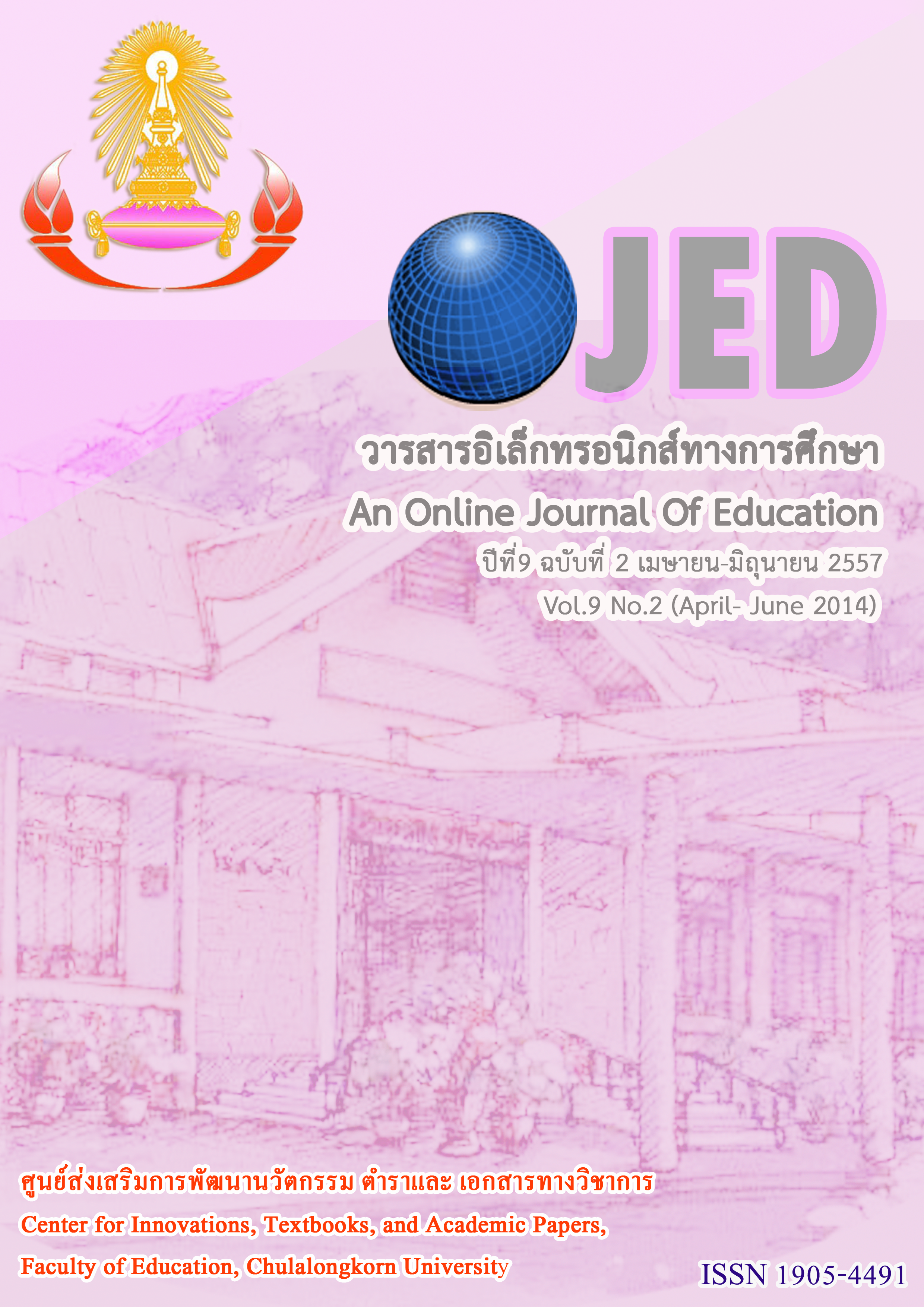ผลการจัดการเรียนรู้วิชาสุขศึกษาโดยใช้แนวคิดแบบห้องเรียนกลับด้านที่มีผลต่อความรับผิดชอบและผลสัมฤทธิ์ทางการเรียนของนักเรียนมัธยมศึกษาตอนต้น
Keywords:
การจัดการเรียนรู้วิชาสุขศึกษา, แนวคิดห้องเรียนกลับด้าน, ความรับผิดชอบ, HEALTH EDUCATION LEARNING MANAGEMENT, FLIPPED CLASSROOM, RESPONSIBILITYAbstract
การวิจัยครั้งนี้มีวัตถุประสงค์เพื่อศึกษาผลการจัดการเรียนรู้วิชาสุขศึกษาโดยใช้แนวคิดแบบห้องเรียนกลับด้านที่มีต่อความรับผิดชอบและผลสัมฤทธิ์ทางการเรียนของนักเรียนมัธยมศึกษาตอนต้น กลุ่มตัวอย่างคือนักเรียนระดับชั้นมัธยมศึกษาปีที่ 3 โรงเรียนสิริรัตนาธร จังหวัดกรุงเทพมหานครฯ จำนวน 60 คน โดยแบ่งเป็น กลุ่มทดลองจำนวน 30 คนซึ่งใช้วิธีการจัดการเรียนรู้วิชาสุขศึกษาตามแนวคิดแบบห้องเรียนกลับด้าน และกลุ่มควบคุมซึ่งใช้วิธีการจัดการเรียนรู้วิชาสุขศึกษาแบบปกติจำนวน 30 คน เครื่องมือที่ใช้ในการทดลองคือแผนการจัดการเรียนรู้วิชาสุขศึกษาโดยใช้แนวคิดแบบห้องเรียนกลับด้าน ใช้เวลาในการทดลองทั้งหมด 8 คาบเรียน รวม 8 สัปดาห์ เครื่องมือที่ใช้ในการเก็บรวบรวมข้อมูลคือ แบบวัดความรับผิดชอบ และแบบวัดผลสัมฤทธิ์ทางการเรียน วิเคราะห์ข้อมูลโดยการหาค่าเฉลี่ย ค่าส่วนเบี่ยงเบนมาตรฐาน และเปรียบเทียบผลการวิเคราะห์ข้อมูลด้วยสถิติทดสอบค่าที (t-test) รวมถึงค่าสถิติวิเคราะห์ความแปรปรวนของตัวแปร Analysis of Covariance (ANCOVA)
ผลการวิจัยสามารถกล่าวโดยสรุปได้ว่าการจัดการเรียนรู้วิชาสุขศึกษาโดยใช้แนวคิดแบบห้องเรียนกลับด้านมีผลต่อความรับผิดชอบและผลสัมฤทธิ์ทางการเรียนของนักเรียนมัธยมศึกษาตอนต้น จากผลการวิจัยดังนี้ 1)ค่าเฉลี่ยของคะแนนความรับผิดชอบและผลสัมฤทธิ์ทางการเรียนวิชาสุขศึกษาของนักเรียนกลุ่มทดลองหลังการทดลองสูงกว่าก่อนการทดลอง อย่างมีนัยสำคัญทางสถิติที่ระดับ .05 2)ค่าเฉลี่ยของคะแนนความรับผิดชอบและผลสัมฤทธิ์ทางการเรียนวิชาสุขศึกษาของนักเรียนกลุ่มทดลองสูงกว่านักเรียนกลุ่มควบคุมอย่างมีนัยสำคัญทางสถิติที่ระดับ .05
The purpose of this research was to study effects of health education learning management using the Flipped Classroom approach on responsibility and learning achievement of lower secondary school students. The subjects consisted of 60 students in the ninth grade of Sirirattanathorn School in Bangkok and divided equally into two groups: the experimental group of 30 students and the control group of 30 students. The experimental instrument consisted of lesson plans using the concurrently Flipped Classroom and normal plan for the control group. The duration of the experiment was eight periods over a span of eight weeks. The data collecting instrument included responsibility test and learning achievements test. The data were analyzed by arithmetic mean, standard deviation and also the t-test including analysis of covariance (ANCOVA) were applied.
The outcomes of this research by conclusion, the Health Education learning management using the Flipped Classroom could be able to enhance responsibility and learning achievement of lower secondary school students. The results were as follow: 1) The students in the experimental group had a higher level of responsibility and learning achievement after using the Flipped classroom development than before at the level of significance of .05. 2) The students in the experimental group had a higher level of responsibility and learning achievement than students in the control group at the level of significance of .05.




